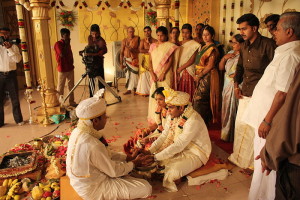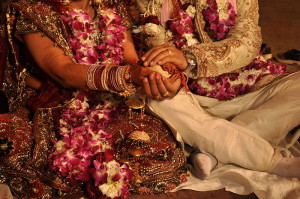Marriage in India
This is the first of 5 articles to appear in the Georgetown Caravel capturing some of my thoughts and experiences through my 3 months in India for the summer. Through GU Impacts, a program of the Beeck Center, I’m interning at the NGO Dream A Dream, which seeks to teach life-skills to youth from low income backgrounds in Bangalore. This is my first experience in India and as I share my understanding and impression of culture and development in India as a foreigner, I obviously don’t see the entire picture. If anything I write on feels just not quite right, don’t hesitate to reach out.
Understanding Marriage in India
“Are you married?” For the first time in the 2 weeks I had spent in India so far, I was speechless. At the age of 21, marriage is absolutely nowhere on my radar. “Uhh, no,” I responded after a brief pause. For the kids who asked me, it was as normal a question as asking me where I was from or what religion I practiced. For a country with a steadily growing population and economy, the social fabric of the country could be transforming even faster. Yet, the existence of both old traditions and newer Western ideals creates a cultural landscape that varies drastically depending on class, family attitudes, and proximity to India’s cities.

The tension between what’s new and what’s old in India is nowhere more apparent than in the subject of marriage. While marriage in many Western countries may be an important milestone, for many Indians, marriage is viewed as the most life changing event. A marriage in India intensely pulls together every possible social obligation - family ties, religion, consideration of tradition, and economic resources. Due to the emphasis on family throughout India, a man or woman will often only move out of their parents’ house when marrying and starting a new family. While many in the U.S. might consider themselves to have reached adulthood after moving to a new place for university, in India, adulthood begins only with a partner after marriage.
The city of Bangalore, a booming tech city home to both countless startups and international branches of mammoth companies like Dell or Accenture, certainly serves as an exception as single young men and women from all over India come to the city for work. The same is true for many other Indian cities, and as an increasing number of Indians send their children to the U.S. and Europe for university, the age at which children move out from the home of their parents is changing.
As I try to understand the state of marriage in India, I encountered many who have talked openly about their parents’ preferences for their marriage and others who have adeptly skirted around the topic. But, understanding the prevalence of arranged marriage in India largely depends on who you talk to and where you get your information. One girl who works at the same center as me at the age of 17 has already received an engagement proposal through an arranged marriage. But, when I asked a sociology masters candidate if she would ever get an arranged marriage, she looked at me with an arched eyebrow and said, “You're kidding me.”
A New York Times article in April of 2015 stated that true love marriages account for only 5% of marriages in India, but in a Times of India self-reporting poll of 600 couples in urban areas, 30% reported to be part of a love marriage. Still, the reality might be more complicated. Today, the use of online matrimonial services like Shaadi.com are increasing the options for bachelors and bachelorettes. Thus, both parents and children are able to find matches that meet their combined criteria. Many say that they are part of a “semi-arranged” marriage, in which both the spouse and the parents have a heavy hand in the marriage. Whether arranged or not, it is clear that many young single Indian men and women are finding increasing agency in determining who they marry.

Many of the interns that I work with talk about how they prefer a love marriage, but are open to an arranged marriage. It is hard for many youths to resolutely refute an arranged marriage when they see the success of the arranged marriage of both their parents and grandparents. I’m also reminded by my peers that despite the prevalence of arranged marriages, India’s divorce rate is among the lowest in the world.
For some, lingering prejudice regarding castes further complicates marriage between partners and their families in a way that I have only started to understand. The act of demanding a dowry from the family of the bride has become illegal throughout the country, but the vestiges of the tradition still persist. Now, the bride’s family will often be expected to give “gifts” to the groom’s family and it’s possible for the the groom’s family to feel insulted if the gifts don’t meet their expectations.
The manager of the hostel where I’m staying has been flustered lately upon hearing the news that her son wishes to marry a girl he’s met at the hotel he works at in Dubai. She appears open to the marriage despite that the bride is from the North and of a different caste. But, the manager is going down to Kerala this weekend to check to see if their horoscopes match and if they don’t, she claims that she will object to the marriage. Feeling like part of a Bollywood movie, I eagerly await the news when she returns.
